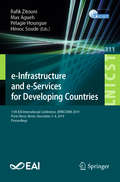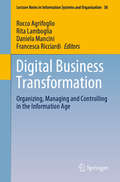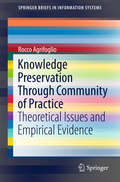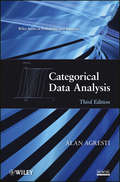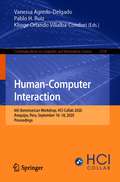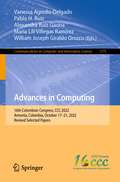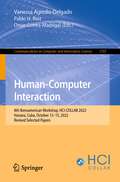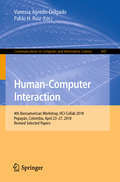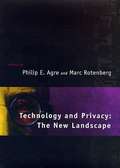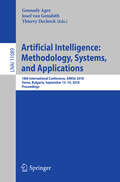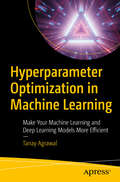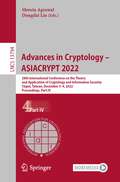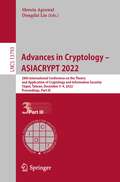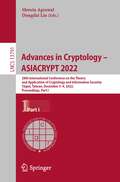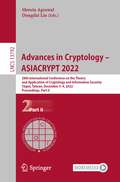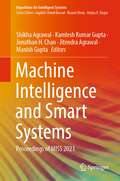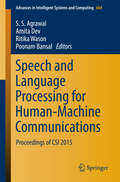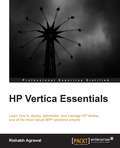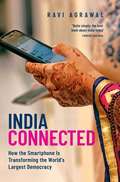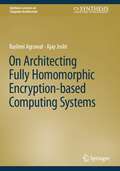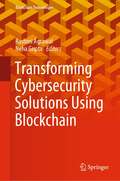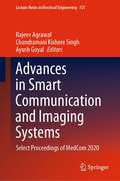- Table View
- List View
e-Infrastructure and e-Services for Developing Countries: 11th EAI International Conference, AFRICOMM 2019, Porto-Novo, Benin, December 3–4, 2019, Proceedings (Lecture Notes of the Institute for Computer Sciences, Social Informatics and Telecommunications Engineering #311)
by Max Agueh Rafik Zitouni Pélagie Houngue Hénoc SoudeThis book constitutes the thoroughly refereed proceedings of the 11th International Conference on e-Infrastructure and e-Services for Developing Countries, AFRICOMM 2019, held in Porto-Novo, Benin, in December 2019. The 19 full papers were carefully selected from 46 submissions. The accepted papers provide a wide range of research topics including targeted infrastructures, Internet of Things (IoT), wireless and mobile networks, intelligent transportation systems (ITS), software and network security, cloud and virtualization, data analytics, and machine learning.
Comment Publier Un E-Book Sans Perdre La Tête (Et Faire En Sorte Que Quelqu'un Le Lise)
by Alejandro Aguayo Lisa SchwartzSi vous avez fait l'acquisition de cet e-book, c'est parce que vous souhaitez publier un livre. Félicitations, vous avez déjà fait le plus important : prendre la décision.
Como Publicar Um Ebook Sem Dar Em Maluco. E Que Alguém O Leia
by Alejandro Aguayo Catarina LopesGuia prático, passo a passo, sobre como publicar um livro electrónico, sem dramas e sem os erros típicos de principiante. Oferece truques, recursos, programas e, principalmente, a experiência de muitos autores indie que triunfam hoje em dia com os seus eBooks, como Blanca Miosi, Bruno Nievas, Enrique Laso, Gabri Ródenas, Lidia Herbada, Roberto López-Herrero, Largo Javariega, entre outros.
How To Publish An Ebook Without Going Nuts... And So Somebody Reads It
by Alejandro Aguayo Charlotte CoombeSecond expanded edition of this simple step-by-step guide to publishing an eBook without dying in the attempt and how to avoid the typical beginner's mistakes. Full of tips, resources, software recommendations and above all the experience and advice of many "indie" authors currently enjoying eBook success, such as Blanca Miosi, Bruno Nievas, Enrique Laso, Gabri Ródenas, Lidia Herbada, Blas Ruiz Grau, Roberto Lopez-Herrero, Largo Javariega and others.
Digital Business Transformation: Organizing, Managing and Controlling in the Information Age (Lecture Notes in Information Systems and Organisation #38)
by Rocco Agrifoglio Rita Lamboglia Daniela Mancini Francesca RicciardiThe recent surge of interest in “digital transformation” is changing the business landscape and posing several challenges, both organizational and sectoral. This transformation involves the application of digital technology in all aspects of business, and enables organizations to create new products and services, and to find more efficient ways of doing business.Moreover, the digital transformation is happening within and across organizations of all types and in every industry, producing a disruptive innovation that can break down the barriers between people and organizations, and help create more adaptive processes. In the information age, it is imperative for organizations to develop IT-related capabilities that allow them to leverage the potential of digital technologies. Due to the pervasive effects of this transformation on processes, firms and industries, both scholars and practitioners are interested in better understanding the key mechanisms behind the emergence and evolution of the digital business transformation.This book presents a collection of research papers focusing on the relationships between technologies (e.g., digital platforms, AI, blockchain, etc.), processes (e.g., decision-making, co-creation, financial, compliance, etc.), and organizations (e.g., smart organizations, digital ecosystems, Industry 4.0, collaborative networked organizations, etc.), which have been categorized into three major areas: organizing, managing and controlling. It also provides critical insights into how the digital transformation is enhancing organizational processes and firms’ performance through an exploration and exploitation of internal resources, and through the establishment of external connections and linkages. The plurality of views offered makes this book particularly relevant for users, companies, scientists, and governments. The content of the book is based on a selection of the best papers (original double-blind peer-reviewed contributions) presented at the annual conference of the Italian chapter of the AIS, which was held in Naples, Italy in September 2019.
Knowledge Preservation Through Community of Practice
by Rocco AgrifoglioThis book links knowledge management literature and information systems research to explore the process of knowledge preservation within a community of practice. It contributes to existing literature in different ways. First, it provides a conceptualization of the "community knowledge preservation" process. In contrast to previous knowledge management research, knowledge preservation is thus viewed as a process in its own right rather than an integral part of knowledge creation and sharing. Furthermore, the book also investigates how communities of practice preserve knowledge, by identifying the main mechanisms and tools enabling members to select, store and actualize the explicit and tacit forms of collective knowledge. More in general, the book presents guidance on how to use communities of practice to ensure the preservation of knowledge in development processes, for individuals and organizations alike.
Categorical Data Analysis
by Alan AgrestiPraise for the Second Edition"A must-have book for anyone expecting to do research and/or applications in categorical data analysis."--Statistics in Medicine"It is a total delight reading this book."--Pharmaceutical Research"If you do any analysis of categorical data, this is an essential desktop reference."--TechnometricsThe use of statistical methods for analyzing categorical data has increased dramatically, particularly in the biomedical, social sciences, and financial industries. Responding to new developments, this book offers a comprehensive treatment of the most important methods for categorical data analysis.Categorical Data Analysis, Third Edition summarizes the latest methods for univariate and correlated multivariate categorical responses. Readers will find a unified generalized linear models approach that connects logistic regression and Poisson and negative binomial loglinear models for discrete data with normal regression for continuous data. This edition also features:An emphasis on logistic and probit regression methods for binary, ordinal, and nominal responses for independent observations and for clustered data with marginal models and random effects modelsTwo new chapters on alternative methods for binary response data, including smoothing and regularization methods, classification methods such as linear discriminant analysis and classification trees, and cluster analysisNew sections introducing the Bayesian approach for methods in that chapterMore than 100 analyses of data sets and over 600 exercisesNotes at the end of each chapter that provide references to recent research and topics not covered in the text, linked to a bibliography of more than 1,200 sourcesA supplementary website showing how to use R and SAS; for all examples in the text, with information also about SPSS and Stata and with exercise solutionsCategorical Data Analysis, Third Edition is an invaluable tool for statisticians and methodologists, such as biostatisticians and researchers in the social and behavioral sciences, medicine and public health, marketing, education, finance, biological and agricultural sciences, and industrial quality control.
Human-Computer Interaction: 6th Iberomarican Workshop, HCI-Collab 2020, Arequipa, Peru, September 16–18, 2020, Proceedings (Communications in Computer and Information Science #1334)
by Vanessa Agredo-Delgado Pablo H. Ruiz Klinge Orlando Villalba-CondoriThis book constitutes the thoroughly refereed proceedings of the 6th Iberoamerican Workshop on Human-Computer Interaction, HCI-Collab 2020, held in Arequipa, Peru, in September 2020.*The 28 full and 3 short papers presented in this volume were carefully reviewed and selected from 128 submissions. The papers deal with topics such as emotional interfaces, usability, video games, computational thinking, collaborative systems, IoT, software engineering, ICT in education, augmented and mixed virtual reality for education, gamification, emotional Interfaces, adaptive instruction systems, accessibility, use of video games in education, artificial Intelligence in HCI, among others. *The workshop was held virtually due to the COVID-19 pandemic.
Advances in Computing: 16th Colombian Congress, CCC 2022, Armenia, Colombia, October 17–21, 2022, Revised Selected Papers (Communications in Computer and Information Science #1775)
by Vanessa Agredo-Delgado Pablo H. Ruiz Alexandra Ruiz Gaona María Lili Villegas Ramírez William Joseph Giraldo OrozcoThis book constitutes the refereed proceedings of the 16th Colombian Congress on Computing, CCC 2022, held in Armenia, Colombia, during October 17–21, 2022The 12 full papers included in this book were carefully reviewed and selected from 40 submissions. They topics of this volume include software engineering and IT architecture, human-computer interaction, cybersecurity and information security, image processing and computer vision, multimedia, artificial intelligence and robotics, education and ICT, data, information and knowledge, distributed systems and large-scale computing, and formal methods in computer systems, among others.
Human-Computer Interaction: 8th Iberoamerican Workshop, HCI-COLLAB 2022, Havana, Cuba, October 13–15, 2022, Revised Selected Papers (Communications in Computer and Information Science #1707)
by Vanessa Agredo-Delgado Pablo H. Ruiz Omar Correa-MadrigalThis book constitutes the refereed proceedings of the 8th Iberoamerican Workshop on Human-Computer Interaction, HCI-COLLAB 2022, which took place in Havana, Cuba, in October 2022. The 15 full papers presented in this volume were carefully reviewed and selected from 53 submissions. The papers deal with topics such as emotional interfaces, usability, video games, computational thinking, collaborative systems, IoT, software engineering, ICT in education, augmented and mixed virtual reality for education, gamification, emotional interfaces, adaptive instructional systems, accessibility, use of video games in education, artificial intelligence in HCI and infotainment, among others.
Human-Computer Interaction: 4th Iberoamerican Workshop, Hci-collab 2018, Popayán, Colombia, April 23-27, 2018, Revised Selected Papers (Communications In Computer And Information Science #847)
by Vanessa Agredo-Delgado Pablo H. RuizThis book constitutes the thoroughly refereed proceedings of the 4th Iberoamerican Workshop on Human-Computer Interaction, HCI-Collab 2018, held in Popayán, Colombia, in April 2018. The 18 full papers presented in this volume were carefully reviewed and selected from 83 submissions. The papers are dealing with topics such as emotional interfaces, HCI and videogames, computational thinking, collaborative systems, software engineering and ICT in education.
Technology and Privacy: The New Landscape
by Philip E. Agre Marc RotenbergPrivacy is the capacity to negotiate social relationships by controlling access to personal information. As laws, policies, and technological design increasingly structure people's relationships with social institutions, individual privacy faces new threats and new opportunities. Over the last several years, the realm of technology and privacy has been transformed, creating a landscape that is both dangerous and encouraging. Significant changes include large increases in communications bandwidths; the widespread adoption of computer networking and public-key cryptography; mathematical innovations that promise a vast family of protocols for protecting identity in complex transactions; new digital media that support a wide range of social relationships; a new generation of technologically sophisticated privacy activists; a massive body of practical experience in the development and application of data-protection laws; and the rapid globalization of manufacturing, culture, and policy making. The essays in this book provide a new conceptual framework for the analysis and debate of privacy policy and for the design and development of information systems. The authors are international experts in the technical, economic, and political aspects of privacy; the book's strength is its synthesis of the three. The book provides equally strong analyses of privacy issues in the United States, Canada, and Europe. Contributors: Philip E. Agre, Victoria Bellotti, Colin J. Bennett, Herbert Burkert, Simon G. Davies, David H. Flaherty, Robert Gellman, Viktor Mayer-Schouml;nberger, David J. Phillips, Rohan Samarajiva.
Artificial Intelligence: 18th International Conference, AIMSA 2018, Varna, Bulgaria, September 12–14, 2018, Proceedings (Lecture Notes in Computer Science #11089)
by Gennady Agre Josef Van Genabith Thierry DeclerckThis book constitutes the refereed proceedings of the 18th International Conference on Artificial Intelligence: Methodology, Systems, and Applications, AIMSA 2018, held in Varna, Bulgaria, in September 2018.The 22 revised full papers and 7 poster papers presented were carefully reviewed and selected from 72 submissions. They cover a wide range of topics in AI: from machine learning to natural language systems, from information extraction to text mining, from knowledge representation to soft computing; from theoretical issues to real-world applications.
Hyperparameter Optimization in Machine Learning: Make Your Machine Learning and Deep Learning Models More Efficient
by Tanay AgrawalDive into hyperparameter tuning of machine learning models and focus on what hyperparameters are and how they work. This book discusses different techniques of hyperparameters tuning, from the basics to advanced methods. This is a step-by-step guide to hyperparameter optimization, starting with what hyperparameters are and how they affect different aspects of machine learning models. It then goes through some basic (brute force) algorithms of hyperparameter optimization. Further, the author addresses the problem of time and memory constraints, using distributed optimization methods. Next you’ll discuss Bayesian optimization for hyperparameter search, which learns from its previous history. The book discusses different frameworks, such as Hyperopt and Optuna, which implements sequential model-based global optimization (SMBO) algorithms. During these discussions, you’ll focus on different aspects such as creation of search spaces and distributed optimization of these libraries. Hyperparameter Optimization in Machine Learning creates an understanding of how these algorithms work and how you can use them in real-life data science problems. The final chapter summaries the role of hyperparameter optimization in automated machine learning and ends with a tutorial to create your own AutoML script. Hyperparameter optimization is tedious task, so sit back and let these algorithms do your work. What You Will LearnDiscover how changes in hyperparameters affect the model’s performance.Apply different hyperparameter tuning algorithms to data science problemsWork with Bayesian optimization methods to create efficient machine learning and deep learning modelsDistribute hyperparameter optimization using a cluster of machinesApproach automated machine learning using hyperparameter optimizationWho This Book Is For Professionals and students working with machine learning.
Advances in Cryptology – ASIACRYPT 2022: 28th International Conference on the Theory and Application of Cryptology and Information Security, Taipei, Taiwan, December 5–9, 2022, Proceedings, Part IV (Lecture Notes in Computer Science #13794)
by Shweta Agrawal Dongdai LinThe four-volume proceedings LNCS 13791, 13792, 13793, and 13794 constitute the proceedings of the 28th International Conference on the Theory and Application of Cryptology and Information Security, ASIACRYPT 2022, held in Taipei, Taiwan, during December 5-9, 2022. The total of 98 full papers presented in these proceedings was carefully reviewed and selected from 364 submissions. The papers were organized in topical sections as follows: Part I: Award papers; functional and witness encryption; symmetric key cryptanalysis; multiparty computation; real world protocols; and blockchains and cryptocurrencies. Part II: Isogeny based cryptography; homomorphic encryption; NIZK and SNARKs; non interactive zero knowledge; and symmetric cryptography. Part III: Practical cryptography; advanced encryption; zero knowledge; quantum algorithms; lattice cryptoanalysis. Part IV: Signatures; commitments; theory; cryptoanalysis; and quantum cryptography.
Advances in Cryptology – ASIACRYPT 2022: 28th International Conference on the Theory and Application of Cryptology and Information Security, Taipei, Taiwan, December 5–9, 2022, Proceedings, Part III (Lecture Notes in Computer Science #13793)
by Shweta Agrawal Dongdai LinThe four-volume proceedings LNCS 13791, 13792, 13793, and 13794 constitute the proceedings of the 28th International Conference on the Theory and Application of Cryptology and Information Security, ASIACRYPT 2022, held in Taipei, Taiwan, during December 5-9, 2022. The total of 98 full papers presented in these proceedings was carefully reviewed and selected from 364 submissions. The papers were organized in topical sections as follows: Part I: Award papers; functional and witness encryption; symmetric key cryptanalysis; multiparty computation; real world protocols; and blockchains and cryptocurrencies. Part II: Isogeny based cryptography; homomorphic encryption; NIZK and SNARKs; non interactive zero knowledge; and symmetric cryptography. Part III: Practical cryptography; advanced encryption; zero knowledge; quantum algorithms; lattice cryptoanalysis. Part IV: Signatures; commitments; theory; cryptoanalysis; and quantum cryptography.
Advances in Cryptology – ASIACRYPT 2022: 28th International Conference on the Theory and Application of Cryptology and Information Security, Taipei, Taiwan, December 5–9, 2022, Proceedings, Part I (Lecture Notes in Computer Science #13791)
by Shweta Agrawal Dongdai LinThe four-volume proceedings LNCS 13791, 13792, 13793, and 13794 constitute the proceedings of the 28th International Conference on the Theory and Application of Cryptology and Information Security, ASIACRYPT 2022, held in Taipei, Taiwan, during December 5-9, 2022. The total of 98 full papers presented in these proceedings was carefully reviewed and selected from 364 submissions. The papers were organized in topical sections as follows: Part I: Award papers; functional and witness encryption; symmetric key cryptanalysis; multiparty computation; real world protocols; and blockchains and cryptocurrencies. Part II: Isogeny based cryptography; homomorphic encryption; NIZK and SNARKs; non interactive zero knowledge; and symmetric cryptography. Part III: Practical cryptography; advanced encryption; zero knowledge; quantum algorithms; lattice cryptoanalysis. Part IV: Signatures; commitments; theory; cryptoanalysis; and quantum cryptography.
Advances in Cryptology – ASIACRYPT 2022: 28th International Conference on the Theory and Application of Cryptology and Information Security, Taipei, Taiwan, December 5–9, 2022, Proceedings, Part II (Lecture Notes in Computer Science #13792)
by Shweta Agrawal Dongdai LinThe four-volume proceedings LNCS 13791, 13792, 13793, and 13794 constitute the proceedings of the 28th International Conference on the Theory and Application of Cryptology and Information Security, ASIACRYPT 2022, held in Taipei, Taiwan, during December 5-9, 2022. The total of 98 full papers presented in these proceedings was carefully reviewed and selected from 364 submissions. The papers were organized in topical sections as follows: Part I: Award papers; functional and witness encryption; symmetric key cryptanalysis; multiparty computation; real world protocols; and blockchains and cryptocurrencies. Part II: Isogeny based cryptography; homomorphic encryption; NIZK and SNARKs; non interactive zero knowledge; and symmetric cryptography. Part III: Practical cryptography; advanced encryption; zero knowledge; quantum algorithms; lattice cryptoanalysis. Part IV: Signatures; commitments; theory; cryptoanalysis; and quantum cryptography.
Machine Intelligence and Smart Systems: Proceedings of MISS 2021 (Algorithms for Intelligent Systems)
by Shikha Agrawal Kamlesh Kumar Gupta Jonathan H. Chan Jitendra Agrawal Manish GuptaThis book is a collection of peer-reviewed best selected research papers presented at the Second International Conference on Machine Intelligence and Smart Systems (MISS 2021), organized during September 24–25, 2021, in Gwalior, India. The book presents new advances and research results in the fields of machine intelligence, artificial intelligence and smart systems. It includes main paradigms of machine intelligence algorithms, namely (1) neural networks, (2) evolutionary computation, (3) swarm intelligence, (4) fuzzy systems and (5) immunological computation. Scientists, engineers, academicians, technology developers, researchers, students and government officials will find this book useful in handling their complicated real-world issues by using machine intelligence methodologies.
Speech and Language Processing for Human-Machine Communications
by S. S. Agrawal Amita Devi Ritika Wason Poonam BansalThis volume comprises the select proceedings of the annual convention of the Computer Society of India. Divided into 10 topical volumes, the proceedings present papers on state-of-the-art research, surveys, and succinct reviews. The volumes cover diverse topics ranging from communications networks to big data analytics, and from system architecture to cyber security. This volume focuses on Speech and Language Processing for Human-Machine Communications. The contents of this book will be useful to researchers and students alike.
HP Vertica Essentials
by Rishabh AgrawalThis is a step-by-step guide with an easy-to-follow approach. A variety of diagrams and images support the concepts explored in the book. This book also contains important tips and tricks, thus making it a really useful reference for Vertica administration activities. If you are a Vertica user or DBA who wants to perform basic administration and fi ne tuning, then this book is for you. Prior knowledge of Vertica will help you to understand the concepts better, but is not mandatory. Some intermediate knowledge of RDBMS, SQL, Linux, and scripting languages such as Perl or Python will be helpful.
India Connected: How the Smartphone is Transforming the World's Largest Democracy
by Ravi AgrawalIndia is connecting at a dizzying pace. In 2000, roughly 20 million Indians had access to the internet. In 2017, 465 million were online, with three new people logging on for the first time every second. By 2020, the country's online community is projected to exceed 700 million; more than a billion Indians are expected to be online by 2025. While users in Western countries progressed steadily over the years from dial-up connections on PCs, to broadband access, wireless, and now 4G data on phones, in India most have leapfrogged straight into the digital world with smartphones and affordable data plans. What effect is all this having on the ancient and traditionally rural culture dominated by family and local customs? Ravi Agrawal's book explores that very question, seeking out the nexuses of change and those swept up in them. Smartphones now influence arranged marriages, create an extension of one's social identity that moves beyond caste, bring within reach educational opportunities undreamed of a generation ago, bridge linguistic gaps, provide outlets and opportunities for start-ups, and are helping to move the entire Indian economy from cash- to credit-based. The effects are everywhere, and they are transformative. While they offer immediate access to so much for so many, smartphones are creating no Utopia in a culture still struggling with poverty, illiteracy, corruption, gender inequality, and income disparity. Internet access has provided greater opportunities to women and altered how India's outcasts interact with the world; it has also made pornography readily available and provided an echo chamber for rumor and prejudice. Under a government determined to control content, it has created tensions. And in a climate of hypernationalism, it has fomented violence and even terrorism. The influence of smartphones on the world's largest democracy is pervasive and irreversible, disruptive and creative, unsettling and compelling. Agrawal's fascinating book gives us the people and places reflecting what the internet hath wrought. India Connected reveals both its staggering dimensions and implications, illuminating how it is affecting the progress of progress itself.
On Architecting Fully Homomorphic Encryption-based Computing Systems (Synthesis Lectures on Computer Architecture)
by Rashmi Agrawal Ajay JoshiThis book provides an introduction to the key concepts of Fully Homomorphic Encryption (FHE)-based computing, and discusses the challenges associated with architecting FHE-based computing systems. Readers will see that due to FHE’s ability to compute on encrypted data, it is a promising solution to address privacy concerns arising from cloud-based services commonly used for a variety of applications including healthcare, financial, transportation, and weather forecasting. This book explains the fundamentals of the FHE operations and then presents an architectural analysis of the FHE-based computing. The authors also highlight challenges associated with accelerating FHE on various commodity platforms and argue that the FPGA platform provides a sweet spot in making privacy-preserving computing plausible.
Transforming Cybersecurity Solutions using Blockchain (Blockchain Technologies)
by Rashmi Agrawal Neha GuptaThis book is targeted towards cybersecurity professionals (especially those dealing with cloud security) or any stakeholders dealing with cybersecurity who want to understand the next level of security infrastructure using blockchain. The book's security and privacy analysis help with an understanding of the basics of blockchain, and it explores the quantifying impact of the new attack surfaces introduced by blockchain technologies and platforms. In addition, the book contains relevant and current updates on the topic. It follows a practical approach to help understand how blockchain technology is used to transform cybersecurity solutions.
Advances in Smart Communication and Imaging Systems: Select Proceedings of MedCom 2020 (Lecture Notes in Electrical Engineering #721)
by Rajeev Agrawal Chandramani Kishore Singh Ayush GoyalThis book presents select and peer-reviewed proceedings of the International Conference on Smart Communication and Imaging Systems (MedCom 2020). The contents explore the recent technological advances in the field of next generation communication systems and latest techniques for image processing, analysis and their related applications. The topics include design and development of smart, secure and reliable future communication networks; satellite, radar and microwave techniques for intelligent communication. The book also covers methods and applications of GIS and remote sensing; medical image analysis and its applications in smart health. This book can be useful for students, researchers and professionals working in the field of communication systems and image processing.
